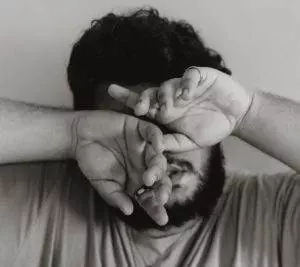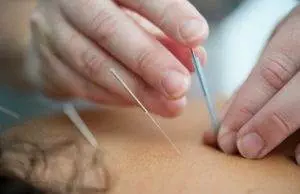By Xiaomei Cai, L.Ac., Ph.D. & Qineng Tan, L.Ac., Ph.D.

Itchy, painful skin rash of blisters on one side of your torso? Burning rash on your face? These are the classic signs of shingles, also known as herpes zoster or varicella zoster, the same viral infection that causes chicken pox. Acupuncture and TCM treatment can calm the acute pain of the shingles rash and help it to heal more quickly, while also offsetting the nerve damage that can result from a herpes zoster infection.
Shingles most often affects older adults, but it can happen to people of all ages. Estimates suggest that one-third of all people will develop herpes zoster at some point in their lives. If you had chicken pox when you were younger, the virus still lives in your body, settling into the nerve tissue in the spinal cord near the brain. When the virus is somehow triggered, it can reactivate, creating a very painful, burning rash, usually in some small, localised area. While medical science hasn’t pinpointed exactly what causes the varicella virus to lie dormant and then reemerge, shingles is believed to be triggered in at least some cases by emotional and mental stress. Chronic stress can cause serious compromisation of the body’s immune system, allowing an old disease to take hold in the body again. People with autoimmune disease, cancer, or HIV may be at increased risk for developing shingles, as well as people who take medications, like steroids, that affect the immune system.
While shingles may go away on its own after a few to several weeks, there can be serious complications. If the rash develops on the face near the eyes, it can cause vision problems, even blindness. Some people develop postherpetic neuralgia (PHN), which can cause the burning, itching, and painful sensations to continue even after the rash on the surface of the skin has cleared up. Neuralgia is basically synonymous with neuropathy, a condition in which nerve cells have been damaged, causing tingling and pain.
If shingles lesions appear near the ears, or affect the facial nerve that connects to the ears, it can lead to Ramsay Hunt syndrome (RHS), also known as herpes zoster oticus, which can cause dizziness or vertigo, earaches, ringing in the ears (tinnitus), and even hearing loss. Other potential complications of shingles include pneumonia and encephalitis (swelling in the brain).
Acupuncture can be an effective alternative or adjunct to conventional medications for helping to relieve the intense acute pain of the shingles rash in the short term, and can also be used to help prevent and alleviate the potential long-term effects of shingles, like postherpetic neuralgia.
Top 5 Symptoms of Shingles

Usually before a shingles rash is visible on the skin, the person will begin feeling a tingling or burning sensation in that area. This can last a few or several days before the rash breaks out.
The signs of herpes zoster include:
- A rash that develops in a stripe (sometimes called a “shingles band” or a dermatome) on one side of the torso, ribcage, or waist area, or on one side of the face near the eye or ear. The rash is red and blistered and causes a lot of pain, burning, and itching.
- Fever
- Headache
- Chills
- Stomach upset, stomachache, nausea, or vomiting
In some cases, the rash clears up on its own within a few weeks. However, because shingles can sometimes become more complicated, creating skin infections and other more serious conditions, it is advisable to seek help from your health care providers as soon as you suspect you might have it.
What Is the Treatment for Shingles?
Shingles is not a curable illness; it is the resurfacing of an old viral infection that pretty much has to run its course. Medical treatment usually involves a prescription for antiviral medication such as Acyclovir, which, if taken within the first few days, may help reduce the severity of the rash and lessen the time that it lasts. Management of shingles pain is mostly taken care of with over the counter pain medications like ibuprofen or acetaminophen, although a doctor may also recommend topical creams, possibly with corticosteroids.
While a person has an active shingles rash, he or she is contagious to other people who have not yet had a case of the chickenpox or the varicella zoster vaccine. This means that other people could contract chickenpox from exposure to the person with shingles; but another person can not get shingles from a person who has shingles. It is important to keep the rash covered, avoid touching and scratching it, wash your hands, clothes, and bedding frequently, and stay away from young children, pregnant women, and anyone who may be vulnerable to getting chickenpox.
How Can Acupuncture Help Shingles?

While the scientific understanding of how viruses spread and function in the human body is clearly still very much a work in progress, acupuncture and herbs have been used to help the condition we recognize as shingles for over a thousand years. TCM philosophy views shingles as being related mainly to heat and dampness. As acupuncturists, we see shingles generally presenting in one of three ways:
- Liver Fire – in this case, the rash will be very red and hot, with a burning sensation. This type of herpes zoster outbreak is probably related to a long period of emotional stress or overwork, possibly combined with an unhealthy diet or too much alcohol consumption. Treatment will focus on clearing the heat from the liver-gall bladder system and reducing inflammation. The next steps of care are to reduce stress and boost immune function.
- Damp Heat – this rash will look more like pus or fluid-filled blisters with a very thin skin. Draining dampness and heat from the body with acupuncture and herbs is indicated.
- Qi and Blood stagnation – this is more the sort of long-term infection that can lead to postherpetic neuralgia, and is related to older age and an overall weakened immune system, and is more likely to be compounded by fatigue and poor sleep. Treatment will focus on getting the qi and blood moving freely through the body again.
Your TCM practitioner will also give guidance about the best foods to add or avoid to help relieve shingles inflammation and nerve pain. In general, avoiding spicy foods, seafood, sugar, and alcohol is a good way to start.
In a research study that combined TCM treatment with medication therapy, the patients who received acupuncture had an extremely low incidence of developing PHN, while 30% of the patients who only received drug therapy ended up with some form of neuralgia and pain still present after three months. The people who had acupuncture healed more quickly and reported less need for painkillers, too.
Another study compared patients treated for shingles with a TCM protocol of acupuncture, herbs and moxibustion only, versus patients treated with antiviral pills, topical creams, and pain relievers. The patients who had acupuncture had a significantly higher overall effectiveness rate (97.7%) compared to the group taking medications (81.8%), with efficacy defined by resolution of pain and clearing of the shingles rash.
Acupuncture Near Me for Shingles
Acupuncture and herbs can be used safely, alone or as an adjunct therapy, to hasten healing of a herpes zoster rash and to prevent long-term nerve damage and pain due to neuralgia. TCM treatment can also work on the other, subtler symptoms of shingles, like headache and stomach upset, without the need for additional medications. Building the immune system back up, helping to repair and prevent nerve damage, and reversing the effects of stress that can trigger a shingles outbreak are other benefits of seeking acupuncture near me for shingles relief and recovery.
*This article is for education from the perspective of Traditional Chinese Medicine only. The education provided by this article is not approved by FDA to diagnose, prevent, treat and cure human diseases. It should not stop you from consulting with your physician for your medical conditions. Traditional Chinese Medicine is based on Qi, which is an invisible force that usually cannot be observed by modern science. Because science focuses on testing ideas about the natural world with evidence obtained through observation, these aspects of acupuncture can’t be studied by science. Therefore acupuncture and Chinese herbs are often not supported by double-blind, randomized trials, and they are considered alternative medicine therapies in the United States.
